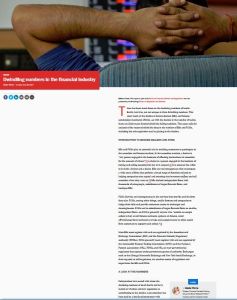加入 getAbstract 阅读摘要

加入 getAbstract 阅读摘要
Hester Peirce
Dwindling Numbers in the Financial Industry
Brookings Institution, 2017
看看什么内容?
Regulation may be behind the declining numbers of US broker-dealers and futures commission merchants.
Recommendation
The well-publicized contraction in the number of banks in the United States aligns with the quieter yet troubling retreat in the quantity of broker-dealers (BDs) and futures commission merchants (FCMs). Increased regulation appears to contribute to the nosedive, according to this thought-provoking article by researcher Hester Peirce. The regulatory burden could help explain why the ranks of small BDs have taken a disproportionate hit and why the FCM firms that remain are quite sizable. The negative consequences of fewer but larger BDs and FCMs include less competition and greater risk to the financial system. getAbstract recommends this notable report to regulators, policy experts and financial professionals.
Summary
About the Author
Hester Peirce is a senior research fellow at the Mercatus Center at George Mason University.





















Comment on this summary